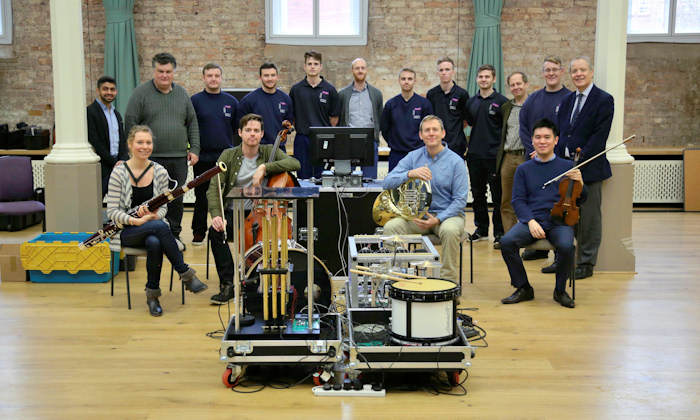Fall under the spell of the Halléoojamaflipaphone
15 Aug 2016
How a new musical instrument, invented right here on campus, is inspiring our city

A new musical instrument, invented right here on campus, is inspiring people across the city – with its very first note.
From The University of Manchester apprentices who designed and built its components to the Halle orchestra, who will use it for their outreach work with struggling school kids and confused dementia patients; it’s easy to fall under the spell of the Halléoojamaflipaphone – which is as wild and wonderful as it sounds.
The Halléoojamaflipaphone is a group of mechanical instruments that play acoustic music, responding in real time to a score coded into a digital format by electrical engineer, PhD student Hassan Hakim Khalili.
Technical apprentices Jake Cartwright and Jacob Skelly – mentored by Hassan – have built one component – a V8 engine block whose eight pistons shake eight cans containing different materials to create eight different sounds. It looks and sounds amazing and can respond to any score, from Beethoven to hip hop.
Meanwhile the snare drum – whose sticks seemingly move all by themselves – can beat faster than any human.
The Halléoojamaflipaphone will play alongside Hallé players at a variety of outreach events with an impact that promises to be “colossal”.
Even its conception was unusual, with engineering and the arts colliding on a train.
Peter Green, senior lecturer at our School of Electrical and Electronic Engineering, and the Hallé’s Education Director Steve Pickett, formed the idea as they commuted to work.
“Engineering and the arts just came together,” Peter recalls. “They are so different – even how Steve and I talk, almost in different languages – yet we have created this.
“The team are working so hard. The apprentices have been front and centre of this, and are doing the University a power of good, while Hassan is now mentoring our own staff because of his expertise.
“And to see what the Hallé can do with it, to see the social benefit, there’s an extra buzz to that.”
Steve, who has composed ‘Bolero Does the Blues’ especially for the Halléoojamaflipaphone with bassoon, French horn, violin and cello, says: “Peter is one of the most engaging scientists I have ever met, it was a thrill to work with him and without him, this wouldn’t have happened.
“20,000 kids play with our orchestra every year and 30,000 take part in our wider programmes. Some of these kids are disengaged, struggling, but we bring them together and they are amazing.
“The Halléoojamaflipaphone could revolutionise this programme, and possibly others, with more instruments being added every year. The impact will be colossal: this is no one hit wonder.”
Peter remembers a Hallé’s violinist bringing an Alzheimer’s sufferer to life as she played for her at a care home event: “She went from motionless to conducting the violinist. Imagine if we could do that?”
Such inspiration – and it comes in the Halléoojamaflipaphone’s first single note.
Jake and Jacob’s first two designs didn’t work but, they recall testing the third: “When it finally worked, when we got that first sound, it hit home – we made this. In many years’ time, it could still be going!”
Hassan agrees: “You test the code and hear the drum, or the tubular bell. Do I play music? Zero! But that’s the beautiful thing – you can still create music.”
- The University of Manchester and Hallé Education created the Halléoojamaflipaphone with thanks to the Engineering and Physical Sciences Research Council Impact Acceleration Account Outreach Fund, Maxon Motor, National Instruments and the Science and Engineering Education Research and Innovation Hub.
